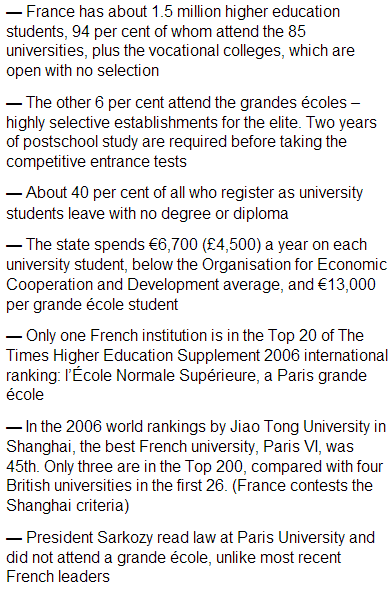|
|
|
|
|
|
|
News & Views item - January 2008 |
![]() French President Nicolas Sarkozy's Reform of Higher Education and Public Funding
Research Moves Forward. (January 12, 2008)
French President Nicolas Sarkozy's Reform of Higher Education and Public Funding
Research Moves Forward. (January 12, 2008)
|
|
 |
|
|
|
Valérie Pécresse -- Credit: Joel SagetAfp/Getty Images |
In June this past year French President Nicolas Sarkozy introduced a reform bill to revamp and resurrect France's decaying higher education system(1, 2). A threatened summer student uprising, caused him to take personal charge of marshalling the bill through the French parliament. Valérie Pécresse, his Higher Education Minister, and François Fillon, the Prime Minister were sidelined, and the boss took charge.
Despite protests the bill was pushed through and in consequence November and December saw student organized occupations and strikes at almost half of France's universities to demand the repeal of the "Pécresse Law."
Now Valérie Pécresse is back in charge of her portfolios and she has announced further reforms the government intends to implement, including a plan to reduce the 50% failure rate among first-year university students. But while some say further shakeups in France's education system are past due, Science reports left-leaning researchers' groups are wary of the minister's plans to boost project-based funding and private research.
Asked by Science if she had been intimidated by the protests she replied: "[if] you want to change things, then you have to be prepared for demonstrations, strikes, and violent uproar. So I knew it was coming. Of course, there was real opposition, but many of the students simply had unfounded fears about the new law. I gave them reassurances, but also I told them: 'This is the law of the Republic. It's being implemented. I cannot repeal it.'"
She also told Science that while the reforms may look minor to the Anglo-Saxon world they were revolutionary for France, and in her view: "The law gives universities the ability to handle their own budgets, their own human resources. They can develop their own research and education strategies--and they will bear responsibility for the success or failures of their labs and students. They can start foundations to raise private money. That's revolutionary, too."
However, Mdm Pécresse indicated that there are no plans to give the universities the authority to select students and "as to tuition fees, my priority is for universities to raise new money through partnerships with the private sector and by offering "lifelong learning" programs, to be paid for by employers."
So far there appears to be no desire on the part of the Sarkozy government to introduce a HECS into the mix, but there certainly are indications that there will be a diminution of reliance on funding from the public purse.
Turning to the matter of public support for Research Science challenged the minister: "Some scientists have expressed concern that your plans will undermine the role of big government institutes like the National Centre for Scientific Research (CNRS) and the National Institute for Health and Medical Research (INSERM). Some fear they might even be turned into funding agencies."
Her reply was to assured Science that neither CNRS nor INSERM would morph into mere funding agencies but their organization will need to change, their administrative mechanisms are far too complex and she has tapped her predecessor, François d'Aubert, to undertake a review.
As to the disquiet of French researchers with regard to a push toward increased reliance on project funding which they believe would "create a rat race and stifle researchers' freedom and creativity", the minister was not sympathetic:
[S]cience is at the service of society. It's paid for with public money that must be invested very efficiently and on the basis of excellence. Project-based funding is part of that strategy. In addition, we can use it to address new research priorities that would otherwise be neglected. And it's not true that it stifles creativity. The ANR [National Research Agency (similar to Australia's ARC)] is also a way to help young, very creative researchers who would not find their way in the current, bureaucratic system.